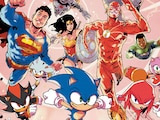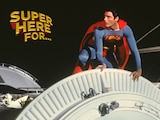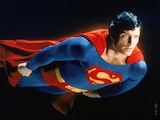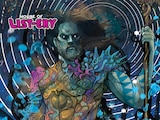Superman, all-powerful last son of a dead world, raised with a human heart. Batman, the peak of human skill and determination haunted by his past. Wonder Woman, the princess of a race of warrior philosophers, on a sacred mission to change the world. And then there’s Aquaman, who…talks to fish. Everybody’s heard the jokes. For many years now, talk shows, sitcoms and schoolyards have made Aquaman the subject of parody. Sure, as cultural icons, DC’s other characters have received their share of ribbing, but it always seems like it’s Aquaman who gets the worst of it. And yet, the 2018 Aquaman film went on to become one of the highest grossing superhero films of all time. It’s enough to make us wonder how the Aquaman jokes all started…and when exactly the world started taking him seriously.
Comparison, Thief of Joy

When people talk about superheroes today, the conversation turns almost immediately to franchise. Shared universes, multiverses, battles and team-ups. But for the first twenty years of the genre as we know it, superheroes didn’t really work like that. Sure, there was the Justice Society of America. But if you read those Golden Age issues of All-Star Comics, you’ll find what essentially amounts to an anthology comic held together by a framing device meant to launch the narrative in multiple directions for each hero. Most superheroes existed within their own world and their own frame of rules and logic. Although he was created in 1941, Aquaman wouldn’t meet his fellow DC Super Heroes until the founding of the Justice League of America in 1960—which meant for all that time, he never had to concern himself with being compared to other heroes. All of Aquaman’s powers and skills were always perfectly applicable, because he was always the star of the story.
In the Justice League of America, Aquaman was always given proper credit as one of the founders. In fact, he was instrumental in their very first battle together against Starro the Conqueror. Soon after his Justice League debut, Aquaman had his own cartoon series, before any DC character apart from Superman.

It was only in the 1970s, a few short years into the more grounded Bronze Age of comics, that the jokes about Aquaman started coming. As comics started getting more serious—and, indeed, even the Aquaman comics at the time featured some rather gripping drama—the public perception of Arthur Curry was being shaped by the Super Friends animated series. Forgoing the majority of DC’s second-stringers, the initial Super Friends lineup featured the tried and true presence of Batman and Robin, Superman, Wonder Woman and…who else? Why, certainly the only other DC hero to have been adapted to television at the time would fit right in. And so, Aquaman was positioned as the fourth of DC’s core heroes, in a team augmented only by teen sidekicks and their dog taken right out of casting for a Saturday morning mystery show.
Up until the 1960s, Aquaman’s solo stories proved that there’s no need to question him when he exists on his own. In Justice League of America, he found his own niche as a specialist on a larger team. But when your core heroes are limited to Batman, Superman, Wonder Woman and then the one guy whose powers only work in the water, that’s when you start drawing comparisons. 1973 is the inflection point where Aquaman really became the Zeppo Marx of DC’s superheroes—an image problem he’d spend the next forty years trying to shake.
We Demand to Be Taken Seriously

After sixty-three issues, Aquaman’s solo series was canceled in 1978. By 1984, one year before the last season of Super Friends, he and his fellow Super Friends would be dropped from the comics’ Justice League lineup altogether for a new generation of heroes. In 1986, the line-wide shakeup of Crisis on Infinite Earths provided an opportunity to present Aquaman with a new face. A four-issue miniseries gave us a sleeker hero in a stealth costume, one similar to the suit featured in Aquaman and the Lost Kingdom. This also marked the beginning of a greater focus on the arcane history of Atlantis itself explored in greater detail in 1990’s The Atlantis Chronicles—connecting Aquaman’s mythology to the 1982 sword and sorcery title Arion, Lord of Atlantis. Aquaman was transformed over this period to not just an aquatic hero, but one charged with the stewardship of the world’s oldest civilization and the source of all magic.
In the ’90s, Aquaman would be plagued by the weight of his crown as the burden of governing a contentious Atlantis grew. His storybook marriage to Mera would fray, leading him to pursue other romantic interests. He’d lose a hand, literally giving Aquaman a new hook (okay, technically it’s a harpoon). He was even given a brand-new backstory, his human father replaced by King Atlan, and his surface boyhood for an oceanic one, removing him further from humanity than ever before. Overall, the order was to present Aquaman as a king first, and a superhero second, more in common with a Robert E. Howard pulp hero than the likes of the Justice League.

In 1997, Aquaman would return to a reformed JLA, stylized by writer Grant Morrison as a modern-day pantheon of gods—Aquaman standing in for Poseidon, lord of the ocean. From the very first story arc, just as Morrison would do by heightening Batman’s powers of deduction and preparedness for any situation to deific proportions, Aquaman’s powers of telepathy and stamina under pressure were elevated to make him formidable in any situation. Joe Kelly’s “The Obsidian Age” storyline in 2002 would center Aquaman as a terrifying force of mystic power as the team banded together to barely survive the might of Atlantis’ ancient magic.
And still, the jokes persisted. If anything, they became more prominent on television in the ’90s, when writers and comedians who had grown up on Super Friends entered the workforce. When none of that worked to affect public opinion, Infinite Crisis got rid of Aquaman altogether in 2005. He was replaced by a new Aquaman, Arthur Joseph Curry, in Aquaman: Sword of Atlantis, though the concept never quite caught its own current.
Smallville Heartthrob

Although its part in Aquaman’s image rehabilitation is often overlooked today, TV’s Smallville played a pivotal role in getting the public to see Aquaman in a new light. Just as the show would expose new audiences to the likes of Green Arrow as more than a lesser Batman, Alan Ritchson’s hunky portrayal of Arthur “AC” Curry in season five did a lot of heavy lifting in getting viewers to consider Aquaman differently. AC’s breakout popularity on Smallville even drove the commission of a pilot for a new Aquaman TV show—and while the show, featuring a separate cast and mythology from Smallville, never made it to series, its presence in DC television history presents the emergence of a bankable status the hero hadn’t carried since the 1960s.
No One Likes Us, We Don’t Care

As the 2000s ticked over to the 2010s, the DC multiverse conspired to try something new: instead of fighting the parody, address it head-on. Batman: The Brave and the Bold presented an “outrageous” Aquaman whose Silver Age bombast was built right into his heart, presenting him as a generous and adventurous spirit who stood as one of Batman’s most stalwart allies. Much of the thesis of The Brave and the Bold cartoon was that superhero stories are, let’s be honest here, inherently silly. Why not lean in?
Not long after, DC relaunched its entire line of comics with the New 52. Once again, the publisher had an opportunity to refresh its heroes for a new audience. And so, Geoff Johns made it his mission to accomplish what so many had attempted before him: he was going to make Aquaman cool. And what would make his attempt different? Like so many after-school specials have taught us, the most important part of being cool is not caring whether you look cool at all. From the first issue, everyone around Aquaman makes all the jokes you’ve ever heard about him and then some. But Arthur doesn’t let it get to him. He’s entirely comfortable in who he is and carries a responsibility most others could never dream of.
Casting the Line

So, how did Aquaman go from a talk show punchline to a billion-dollar franchise? Some might tell you it was a stroke of good timing, and sure, that’s a big part of it. But it would be disingenuous to minimize the impact of the actor himself. Superman had Christopher Reeve, Batman had Adam West, and Aquaman has Jason Momoa.
Zack Snyder and his casting director, Kristy Carlson, caught something in Momoa that the world had yet to see. They saw the vastly underrated performance of a future king in 2011’s Conan the Barbarian. They saw a comedic side to him, one just as willing as The Brave and the Bold’s Aquaman to not take himself too seriously. In Momoa, you had a born action hero who could toss off a joke that audiences could quote back for years.
Outside of the monthly comic book faithful, people don’t think about Super Friends anymore when they think about Aquaman. They don’t even think of him as blonde anymore. He’s not a king, or a god, or a wizard. He’s Jason Momoa, superhero, in a career-defining role. We can watch him ride the crest of that wave for one more swim right now in Aquaman and the Lost Kingdom and we’ll see where the tides take us next.
Aquaman and the Lost Kingdom, directed by James Wan and featuring Jason Momoa as Aquaman, is now in theaters. For news, trailers and other features on the King of Atlantis, visit our official Aquaman hub page.
Alex Jaffe is the author of our monthly "Ask the Question" column and writes about TV, movies, comics and superhero history for DC.com. Follow him on Bluesky at @AlexJaffe and find him in the DC Community as HubCityQuestion.
NOTE: The views and opinions expressed in this feature are solely those of Alex Jaffe and do not necessarily reflect those of DC or Warner Bros. Discovery, nor should they be read as confirmation or denial of future DC plans.




















